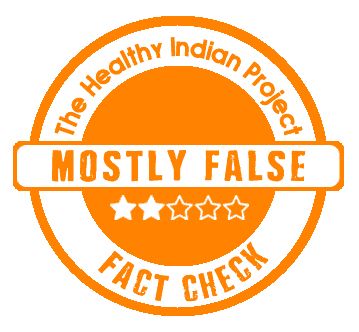Last Updated on November 17, 2023 by Neelam Singh
Quick Take
A social media post claims that gazing at the sun for a long is beneficial. The video further claims that looking at sun will help the body get essential chemicals. The list includes serotonin, dopamine, melatonin, vitamin D and A. We fact-checked and found this claim to be Mostly False.

The Claim
In a YouTube video, an interviewer asks, “Can staring at the sun harm your eyes or cause blindness?”. The man who claims to have been doing so for 6 years negates it. He claims, “People are brainwashed into thinking the sun harms their eyes.”
This man adds that wearing sunglasses means losing Vitamin D. He further states that people who wear sunglasses trick their brains into thinking there is no sunlight. This prevents essential chemical release.
We have attached the screenshot the post below:

Fact Check
Can gazing at the sun be harmful to the eyes?
Yes, gazing at the sun can be extremely harmful to the eyes and can result in permanent damage. The sun emits intense light, including ultraviolet (UV) radiation. This light can be particularly damaging to the delicate structures of the eye. Here are some of the risks associated with staring at the sun:
- Solar Retinopathy: Staring at the sun can cause solar retinopathy. It is more common especially during a solar eclipse when the sun is partially covered by the moon. This condition occurs when the intense light from the sun damages the cells in the retina, the light-sensitive tissue at the back of the eye. Solar retinopathy can result in blurred or distorted vision and may be irreversible.
- Macular Degeneration: It has been suggested that the most sensitive part of the retina, called the macula might be damaged due to sun exposure. Damage to the macula can lead to central vision loss, making it difficult to see fine details or read.
- Photokeratitis: This is a painful condition that can occur after staring at the sun for even a short period without protection. It’s essentially a sunburn on the cornea, the clear front surface of the eye. Symptoms include redness, pain, tearing, and a gritty feeling in the eyes. Photokeratitis is usually temporary but can be quite uncomfortable.
- Cataracts: Long-term exposure to UV radiation from the sun is a risk factor for the development of cataracts, a clouding of the eye’s natural lens. Cataracts can lead to blurred vision and eventually require surgical removal.

Dr. Aditya Sethi, Cataract, Refractive, Paediatric Ophthalmologist and Strabismus Surgeon in Gurgaon states, “Prolonged sun gazing can result in solar retinopathy, causing damage to the retinal cells due to intense solar radiation. The harmful effects include permanent vision impairment. Scientifically, it is universally discouraged to stare directly at the sun without adequate protection, such as solar viewing glasses, to prevent irreversible damage to the eyes.”
Does wearing sunglasses do more harm than good?
No, wearing sunglasses does not do more harm than good. In fact, wearing sunglasses is one of the best things you can do to protect your eyes from the sun’s harmful ultraviolet (UV) rays.
UV rays can damage the cornea, the clear front part of the eye, and the lens, the clear structure inside the eye that focuses light. Over time, UV exposure can lead to cataracts, macular degeneration, and other serious eye problems, as mentioned above.
Sunglasses help to protect your eyes from UV rays by blocking them from reaching your eyes. When choosing sunglasses, it is important to select a pair that blocks 99-100% of UVA and UVB rays.
Some people worry that wearing sunglasses will make them lose Vitamin D. Also those who wear sunglasses trick the brain thinking that there is no sunshine. So, the essential chemicals body needs will not release. However, there is no evidence to support these claims. In fact, wearing sunglasses can help to keep your eyes healthy and strong by protecting them from the sun’s harmful rays.

Dr Aftab Alam, Ophthalmologist informs, “Sunglasses shield the eyes from harmful UV rays. However, they often leave the skin around the eyes susceptible to sun exposure. Extended periods of direct sunlight without adequate protection can result in sunburn on the exposed facial areas. Furthermore, reflective surfaces like water, sand, and snow can intensify overall sun exposure, increasing the risk of skin burns. Overexposure to UV rays, particularly from direct sunlight, can lead to a condition known as photokeratitis, often referred to as sunburn of the eyes. This condition manifests as redness, tearing, and discomfort in the eyes. Wearing sunglasses with proper UV protection can assist in preventing photokeratitis. It is worth noting that cheap sunglasses might lack sufficient UV shielding, potentially jeopardizing both eye health and the delicate skin around the eyes.
Remember, prolonged exposure to direct sunlight can lead to problems like heat rash or sunstroke. While wearing sunglasses is good to safeguard the eyes from UV damage, it is crucial to prioritize comprehensive sun protection to prevent sunburn and related skin problems.”
However, choosing the right sunglasses and using them wisely is key to reaping these benefits while avoiding potential harm.
Similarly, a claim about sunglasses went viral which stated that wearing sunglasses can cause skin burns.
Is gazing at the sun for a long duration beneficial?
No, gazing at the sun for a long duration is not beneficial and can be extremely harmful to your eyes. The sun emits intense light, including ultraviolet (UV) radiation, which can cause serious damage to the delicate structures of the eye. Prolonged exposure to the sun without proper eye protection can result in various eye conditions. It is true that an absolute lack of sun exposure can lead to Vitamin D deficiency, but there is no evidence confirming that staring at the sun for a long period of time will fulfill the requirements without any harm.
Additionally, according to the U.S. Centers for Disease Control (CDC), too much exposure to ultraviolet (UV) rays influences most skin cancers. Excess UV radiation can damage the skin cell’s DNA and lead to skin cancer. UV radiation damages the DNA in the cells, which accumulates with time. It also increases the likelihood of genetic mutations, which cause cancer. Melanoma, a type of skin cancer, can be prevented in 9 out of 10 people by staying safe in the sun and avoiding sunbeds. Some people believe that skin cancer is caused by diet solely. However, this is not true.
If you want to observe the sun, it is essential to use proper eye protection, such as eclipse glasses or welder’s goggles designed for solar viewing, during events like solar eclipses. Never look directly at the sun without appropriate eye protection, as doing so can have severe consequences for your vision.
Disclaimer: Medical Science is an ever evolving field. We strive to keep this page updated. In case you notice any discrepancy in the content, please inform us at [email protected]. You can futher read our Correction Policy here. Never disregard professional medical advice or delay seeking medical treatment because of something you have read on or accessed through this website or it's social media channels. Read our Full Disclaimer Here for further information.

